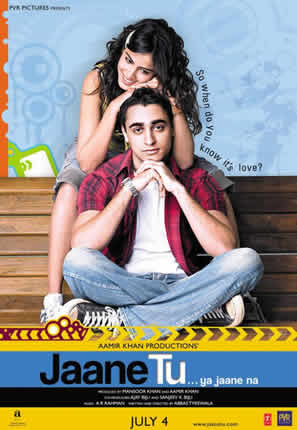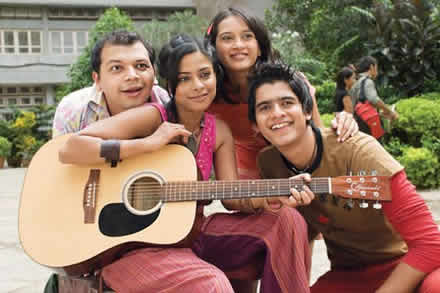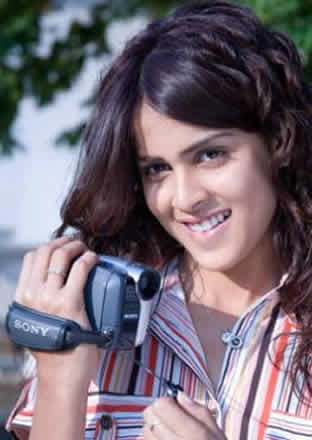We often went to the movies. The screen lit up and we trembled…But more often than not Madeleine and I were disappointed. The pictures were dated, they flickered. And Marilyn Monroe had aged terribly. It made us sad. This wasn’t the film we’d dreamed of. This wasn’t the total film that each of us had carried within himself…the film we wanted to make, or, more secretly, no doubt, that we wanted to live.
Paul, in Jean-Luc Godard’s Masculin féminin
Jaane Tu Ya Jaane Na is a film of the 21st century, born under the eyes of the producers, marketed viciously under the lens of the PR team, hyped and buzzed to such a state that one is made to believe this one would be different from everything else being made in the country. But like many of its similitude’s in Bollywood, this film too is just a marketing gimmick. It does not have the naïve innocence or even a well carried narrative like QSQT (Qayamat Se Qayamat Tak), neither does it have well laid characters like Dil Chaatha Hai, nor does it have any foundation on which innocent love could be explored; something which this movie was to deal with, and to top it all, even the idea to  slight alter the narrative with flashbacks serves no purpose, in short , its just another movie, another feel-good- Bollywood– film, but even in that department it’s a let down. Therefore, when the girl to whom the pure innocent and greatness of the couples love (Imraan Khan and Genelia D’ Souza) was narrated; she kisses them on their arrival (as she appear overwhelmed with the power of love); but it just seemed too rigid and fake, because the photographic character felt empathy towards their love, but this could not be felt outside the cinematic space, I personally, as an audience, felt a scorn for being cheated, after all, from the opening disorienting camera movement, with loud chatter, sudden zoom –out- shots, and quick cuts; we could guess what to expect- same old story, and same old mise-en-scene.
slight alter the narrative with flashbacks serves no purpose, in short , its just another movie, another feel-good- Bollywood– film, but even in that department it’s a let down. Therefore, when the girl to whom the pure innocent and greatness of the couples love (Imraan Khan and Genelia D’ Souza) was narrated; she kisses them on their arrival (as she appear overwhelmed with the power of love); but it just seemed too rigid and fake, because the photographic character felt empathy towards their love, but this could not be felt outside the cinematic space, I personally, as an audience, felt a scorn for being cheated, after all, from the opening disorienting camera movement, with loud chatter, sudden zoom –out- shots, and quick cuts; we could guess what to expect- same old story, and same old mise-en-scene.
Jaane Tu Ya Jaane Na is about Jai Singh Rathore a.k.a Rats (Imraan Khan), a Rajput who doesn’t believe in violence and Aditi Mahant a.k.a Meow (Genelia D’Souza), a cute and violent girl. They are the inseparable friends in college who everyone thinks are happily in love. Things turn ugly when their parents decide to get them married, and they realize they are just friends. And never did they think of each other as lovers, so what follows next is something which has been repeated in Bollywood film chronicles ever since the dawn of our cinema and exactly in the same mannerism. I wonder why so many ingredients and sub-plot are inserted without purpose, instead of just exploring the duality, complexity of human nature especially the “youth” the film set out to depict.
The film is supposed to be a coming-of-the-age tale where the promises, insecurities, and the ever fleeting nature of love, friendship, the desire to seek and  realize when one is young were to be shown- something one believed from looking at the trailers: the pepped up Jazz theme song, the semblance it had to our everyday realities, and the freshness it projected, but I didn’t know I would be duped. Except for few comic setups involving the trio of great actors: Naseerudin Shah(Jai’s dead father), Ratna Shah Phatak (Jai’s mum) , and Paresh Rawal(police inspector), the whole film is made up of witty lines, which sometimes are good, cute exchanges of names and gestures and, plot, which is pure laughable. Since, the film is a mixed bag; it tries to be funny; it tries to expose hidden emotion, and it also tries to capture the zeitgeist of our generation: through the use of lingo, setting and plot. But the reality is that it fails on most counts.
realize when one is young were to be shown- something one believed from looking at the trailers: the pepped up Jazz theme song, the semblance it had to our everyday realities, and the freshness it projected, but I didn’t know I would be duped. Except for few comic setups involving the trio of great actors: Naseerudin Shah(Jai’s dead father), Ratna Shah Phatak (Jai’s mum) , and Paresh Rawal(police inspector), the whole film is made up of witty lines, which sometimes are good, cute exchanges of names and gestures and, plot, which is pure laughable. Since, the film is a mixed bag; it tries to be funny; it tries to expose hidden emotion, and it also tries to capture the zeitgeist of our generation: through the use of lingo, setting and plot. But the reality is that it fails on most counts.
It is not a film about “youth” since even before their college lives could be explored- our character graduate, leaving a void to explore the dead time and moments related very closely to our lives. And even their bonds of friendship are mainly narrated, but never shown building up, so we are already placed with paper cut characterization whose development through the films is stagnant. The entire college life is summed up in one single song and brief fight scene, which is mainly used to establish the characteristic of the protagonists, otherwise nothing much else happens in college. Hence the “graduation party” appears extremely plastic and one dimensional.
Even the gradual shift from college and the sudden realization that one has to do something out of life is never fully attained. Jai wants to do MBA, go for interviews but we never move beyond one or two exchanges of dialogues. Aditi wants to make films and attend NYU, that again, remains stagnant, the urgency and exposition of the realities of the world are deep buried under long walks, picnics, parties and the two protagonist realization of their love. Even the long walks, the picnics, the parties, has no value and does not resonate to the way we actually live, perhaps, it’s a Bollywood arsenal to give us a fantasy and glimpse of lives we could never possibly live, but then wasn’t this film suppose to explore something different? Didn’t we all believe that it could be true? Furthermore, most people tend to forgive such films in their short coming because of the manufactured dialogues and comic scenes used primarily in most Bollywood films to hide its black holes.
This is Abbas Tyrewala’s first film as a director, and I wish he continues writing dialogues and screenplays than directing films, since his direction has lots to be desired for. The entire film is loosely paced and one can start getting the feeling that things are dragging without reasons, even if, adhering to the pure classical sense of dramaturgy. If the plot lacked the pace it was because of the uneven and awkward rhythm of most shots, for example: the shot when Meow (Genelia D’Souza) calls up Rats (Jai Singh Rathore) the camera lingers on her for sometime before it cross cuts to him. The sheer time on her completely takes away any intricate rhythm that could have been build, before cutting to Jai sitting down on the sofa, and hence takes away the basic function that the shot could have provided aesthetically. Sadly, the film shot on Cinemascope does not make use of the extra widescreen space it provides, and most composition lacked any form of ingenuity. As Cinemascope like DI effect today is used more for cosmetic purpose and most Bollywood film mise-en-scene: the camera, the framing, the lighting is very much the same. So, it’s not surprising that most wide shots (master) were slightly asymmetrically and oddly framed only to allow characters to enter the scene rather than build anything out of the layers of space from which spatial and temporal relationship can be build.
of ingenuity. As Cinemascope like DI effect today is used more for cosmetic purpose and most Bollywood film mise-en-scene: the camera, the framing, the lighting is very much the same. So, it’s not surprising that most wide shots (master) were slightly asymmetrically and oddly framed only to allow characters to enter the scene rather than build anything out of the layers of space from which spatial and temporal relationship can be build.
Abbas Tyrewala’s style and background in writing can be seen in the song lyrics or even in the dialogues, however, the direction is so loose and mise-en-scene so weak, that anyone can direct this film. I mean, I have failed to understand- Why do directors even exist in Bollywood? After all, if the basic foundation to stage a scene and bring out a personal cinematic vision is never carried out, what is the purpose of a director? As a cinematographer and an editor can very much do the same thing which most Bollywood director bring to their staging: almost identical shots in most scene, take for example, most interior shot, would have an overhead camera angle as a master before moving in a reverse shot. And like most Bollywood films the basic movements of characters are editing dominated and never adhere to the movements in space. This means taking enough coverage and bombarding the viewers with television like cut, copy and pastes. No wonder we lack great directors or auteur in Bollywood, after all, the idea is just to illustrate the screenplay in best way possible to “tell” the “story”- filmed literature and theatre to a large extent, but quite frankly not cinema.
The way the characters speak, and a number of their gestures in the film makes me believe they are recent High School Graduates and definitely not College pass-outs. Imran Khan has shades of his uncle in his looks, but not quite there when comparing their debut performances. Genelie D’ Souza growth from a naïve tom boyish girl to her engagement never actually build in terms of her inherent characterization. But she does not appear plastic like most our Indian  actresses and manages to convey certain expression of jealousy and love. The narrative is held on the shoulders of their group Rotlu (Ravindran), Shaleen (Sugandha Garg), Jiggy (Nirav Mehta), Bombs (Alishka Varde) who carry the task of narrating their fairytale love story, and more often than not, I felt they behaved like students in Class 11 or 12 and not like people who seem out of college. Beside these characters belong more to Bollywood stereotypes and has just glimpses from the people we know, we meet or don’t know. This is definitely one of the weakest script Abbas Tyrewala has written, since the film could have really be an honest tale about love and friendship, in pure cinematic sense, even with songs and dances. But the film is nothing but a masala Bollywood offering with new faces and jazzed soundtrack to create the illusion of freshness. Because “freshness” means infusing all areas of cinema to blend together to offer something new, but sadly it does not. Yet, it will appear fresh, because one is so used to eating junk food; that even a third rate cooked meal would appear “fresh”, “delicious” and “tasty”.
actresses and manages to convey certain expression of jealousy and love. The narrative is held on the shoulders of their group Rotlu (Ravindran), Shaleen (Sugandha Garg), Jiggy (Nirav Mehta), Bombs (Alishka Varde) who carry the task of narrating their fairytale love story, and more often than not, I felt they behaved like students in Class 11 or 12 and not like people who seem out of college. Beside these characters belong more to Bollywood stereotypes and has just glimpses from the people we know, we meet or don’t know. This is definitely one of the weakest script Abbas Tyrewala has written, since the film could have really be an honest tale about love and friendship, in pure cinematic sense, even with songs and dances. But the film is nothing but a masala Bollywood offering with new faces and jazzed soundtrack to create the illusion of freshness. Because “freshness” means infusing all areas of cinema to blend together to offer something new, but sadly it does not. Yet, it will appear fresh, because one is so used to eating junk food; that even a third rate cooked meal would appear “fresh”, “delicious” and “tasty”.
This film is a testament of the fact that if, you have money, some good connection, super star uncle, father, grandfathers, it’s possible to have a healthy film debut, and dance your way to the next film. During one of the opening dialogue of the film, Abbas Tyrewala not only pens down the nature of Bollywood but a premonition or elegy about his own film when Ratna Shah Phatak confesses: “That the era of good films has been lost”, and this statement not only holds true for this film, but several other manufactured films by the Bollywood machine. Beside just before the credit rolls, the camera captures a person lying down and holding a card with “ Mr. Godot” scribbled on it, who we all know would never arrive, not only to save this film or save the fate of our industry, but then again, there is always the human nature to seek out and hope. Perhaps, like the symbolical dream of Jai in the film, we need a rider to slice through the simulated and inflated ego of Bollywood and bend them for taking us for granted. It is then only we can move away from the “Cinema of Quality” and the “Cinema of Papa” to make much more personal and important films that could show us- who we are, where we come from, and what we seek in an honest manner.
Director: Abbas Tyrewala
Writer: Abbas Tyrewala (writer)
Release Date:
4 July 2008 (India)
Language: Hindi

